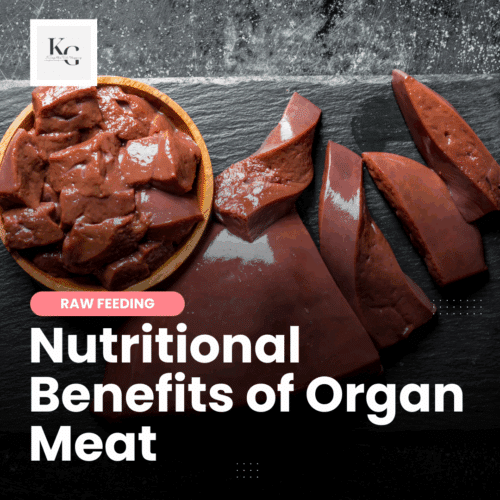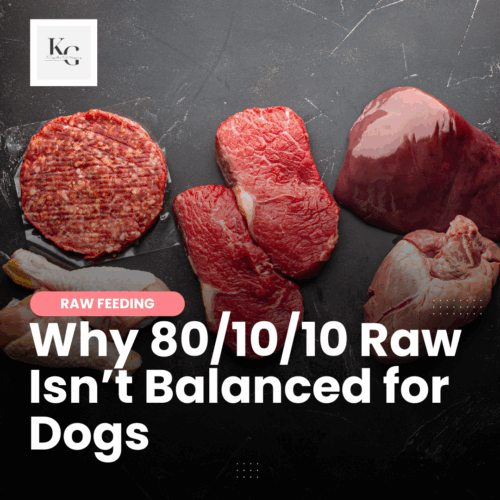Keep the Tail Wagging is supported by pet parents. I occasionally earn a commission (at no additional cost to you) when you click through an affiliate link to one of my favorite products. Thank you for your support. Read More
Many raw feeders are trying to replicate an ancestral diet for their dogs, choosing foods for their dogs based on what they believe a grey wolf would or wouldn't eat. This logic is why I originally thought sweet potatoes weren't good for dogs – I didn't think they were “species-appropriate” because…
- sweet potatoes add too much sugar to a dog's diet
- sweet potatoes are difficult to digest
- wild wolves aren't digging up and consuming sweet potatoes
- sweet potatoes cause heart disease
- dogs don't have a biological requirement for carbs or starch
The more I learned about sweet potatoes, the more I realized they have a solid place in a dog's diet. This isn't a food I would feed regularly, but it is an ingredient my dogs enjoy occasionally.
Benefits of Sweet Potatoes for Dogs
Sweet potatoes are a delicious and versatile vegetable for humans and a nutritious addition to a dog's diet. Packed with essential nutrients and health benefits, sweet potatoes can be a valuable component of a well-rounded canine nutrition plan.
- Rich in Fiber: Sweet potatoes are a good source of dietary fiber that aids digestion, promotes gut health, and helps regulate bowel movements in dogs.
- Vitamins, Minerals, and Antioxidants: Sweet potatoes are loaded with vitamins A and C, as well as minerals like potassium, which support immune function, vision health, energy metabolism, and overall well-being in dogs.
- Vitamin A: Essential for vision, immune function, and skin health in dogs.
- Vitamin C: Acts as an antioxidant, supporting immune function, reducing inflammation, and promoting collagen production.
- Potassium: Important for muscle function, nerve transmission, hydration, and overall health in dogs.
- Low in Fat: Sweet potatoes are low in fat, making them a healthy, natural treat that won't lead to weight gain.
How to Prepare Sweet Potatoes for Dogs
Sweet potatoes aren't a large part of my dogs' diet, but they do have a place as a source of fiber. While I can buy canned sweet potatoes, I prefer buying (or growing) fresh potatoes and cooking them for my dogs.
- Cooked and Mashed: Boil or bake sweet potatoes until soft, then mash or chop them into bite-sized pieces for easy digestion.
- Dehydrated Sweet Potato Chews: Slice sweet potatoes into thin strips, dehydrate them in the oven or a dehydrator until chewy, and offer them as a healthy, homemade dog treat. Dr. Harvey's makes sweet potato chews that dogs enjoy.
- Canned Pureed Sweet Potatoes: To address loose stool or diarrhea, add a tablespoon (or two) of pureed sweet potatoes.
Due to their rich nutrient profile, sweet potatoes can provide a range of health benefits for dogs. It's more affordable to cook sweet potatoes, creating a mashed dish to add fiber to the diet, boosting gut health and promoting a robust immune system. By preparing sweet potatoes in dog-friendly ways and understanding the role of each essential nutrient they offer, you can enhance your dog's diet and well-being for years to come.

















I was feeding a basic raw food diet. When Sydney had yeast issues, they presented in her ears and I cleaned them with a mixture of water and apple cider vinegar daily before bed and then massaged a small amount of CocoTherapy coconut oil in her years. I did this for 5 or 7 days and she never had an issue again. I’m not sure if this would work for paws. I’ve never had a dog with yeasty paws.
I believe my dog does have yeast issues .
She has that yeasty smell , itchy and licking her paws a lot .
I cut out grains a long time ago but not seeming to help .
Can you please give me recipe you were feeding your dog with these issues ? Thanks
My dog does have yeast issues .
Can you please share the diet you fed your dogs that helped with this issue ? 🙏🏻🐶
I feed small amounts of sweet potatoes (with the skin) in rotation with pumpkin. I learned with Major’s EPI-like tummy issues…both have soluble AND insoluble fiber (like carrots and celery) and can help with both constipation and diarrhea.
It’s my understanding, by leaving the skin on…I can increase the fiber (and antioxidants) which, in turn, helps balance the sugars in the potato. Nothing goes to waste.
My vet now recommends cooked ground turkey and sweet potatoes rather than the traditional chicken and rice when dogs have digestive upset.